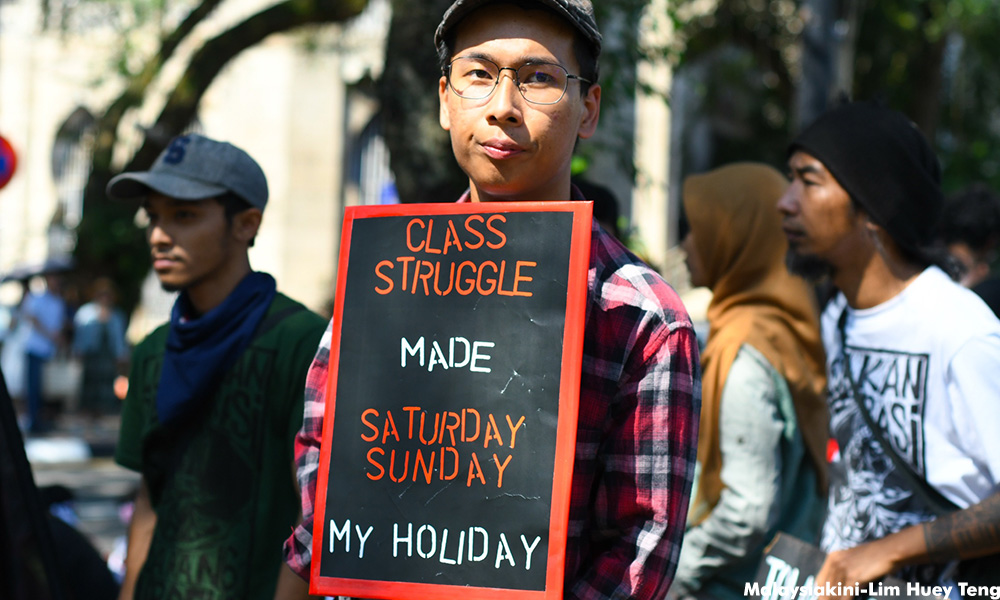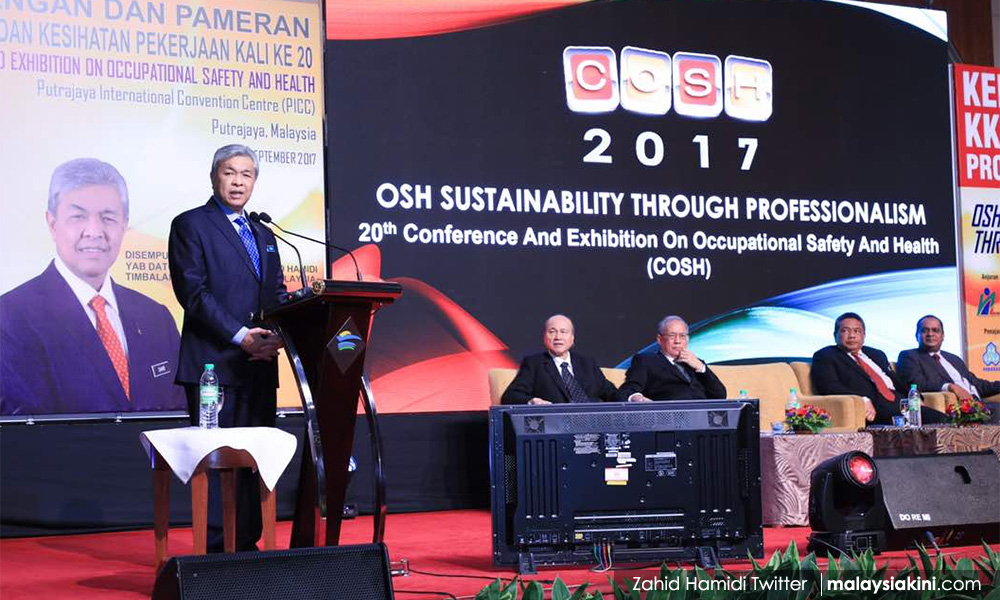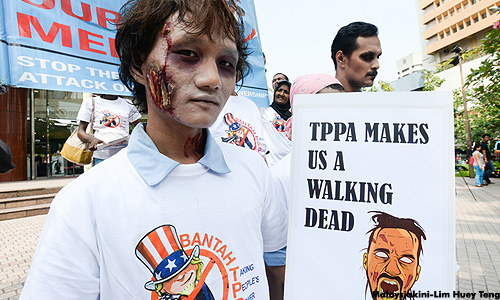Part 4 of 4 parts
The state of the labour movement in Malaysia (Part 1)
The origins of the labour movement in M’sia (Part 2 of a series)
How the British suppressed the Malayan labour movement (Part 3)

The last breath of the labour movement?
This is the final part of a series on the Malaysian labour movement.
FEATURE | Malaysia continues with
its “divide and rule” policy with the labour movement, permitting only
unions based on occupation, sector and industry, and disallowing the
formation of unions or federations across different sectors.
Private and public sector workers alike are still prevented from
belonging to common unions. The Malaysian Trades Union Congress (MTUC)
and the Congress of Unions of Employees in the Public and Civil Services
(Cuepacs) continue to be registered as societies.
The justification for the control of unions and labour rights is
“competitiveness,” or the need for Malaysia to attract foreign investors
to set up factories, and hence create jobs and income.
Low wages and a passive workforce make Malaysia attractive, and the
fact that there have been no mass strikes for almost four or more
decades is seen as a positive.
Such justifications may be good for businesses, but it certainly is
not helping workers. Their wages remain low, and their rights continue
to be eroded. A perusal of laws will see that the Umno-BN government has
been continuously eroding worker rights through various amendments of existing laws, and even a handful new laws.
Worker rights education is also not a priority, and is absent from
the curriculum. Hence, many workers are not even aware of existing
rights in Malaysia, and more importantly, how they can claim it.
The government does not seem to be bothered as well with the
inspection and enforcement of labour and trade union rights, except
maybe for occupational safety and health rights (photo).

The Human Resources Ministry’s statistics on employment and labour,
for instance, provide no figures of the number of inspections and
enforcement actions concerning labour rights, save for matters
concerning occupational safety and health, even though the law permits
authorities to do so.
This would suggest that Malaysia may not even be interested in
protecting existing worker and trade union rights. These inspections
must be done randomly, and/or based on information received on alleged
violations.
To not act until victims to lodge formal complaints – particularly in
the Malaysian labour context, where many employees are easily
terminated if they lodge complaints – is unreasonable.
'Unions remain weak'
Union busting continues. Union presidents and leaders are easily
terminated for issuing public statements. Union members are terminated
for sending memoranda to election candidates to get them to commit to
the struggle for better worker rights.
Workers participating in legal pickets are arrested for “making
noise.” Union registration and “recognition” processes are delayed, not
expedited – not just by government bodies, but also by allowing
drawn-out litigations initiated by employers.
Malaysia finally introduced its minimum wage in 2013, which was
bumped up to RM1,000 (Peninsular Malaysia) and RM920 (East Malaysia) per
month in 2015.
The figure is absurd when the government itself acknowledges that
families with a household income of less than RM4,000 per month are in
need of BR1M assistance (logically, assuming a family unit has two
income earners, the minimum wage should really be set at RM2,000).
But even here, there were not only implementation delays granted to
employers, but also a lack of enforcement against errant employers who
refused to pay even the paltry figure.
Unions remain weak. Mass layoffs of unionised workers in the
thousands are met with muted protests, if any, such as in the case of
Malaysia Airlines.
The labour movement in Malaysia has been weakened successfully. The
reasons are not just laws and government policies, but also weak,
fearful union leaders and members cowed into submission.
The unwillingness of workers and unions to stand for their rights and
fight for better worker and trade union rights is a major problem – no
struggle will mean no improvement. To depend solely on the government to
bring about improvements for rights is foolish, especially when its
victims fail to highlight abuses in the first place.
As noted previously,
Malaysia’s worker and trade union laws fall short of existing
international standards, which became evident when even the now-defunct
Trans-Pacific Partnership Agreement (TPPA) – which could have in theory
overruled existing labour laws – set improved labour rights as one of
its provisions.

It is perhaps good that some countries, as a matter of policy and
law, have adopted policies that they will not enter into trade
agreements with countries that do not at the very least have a minimum
standard of human and labour rights.
The government claimed that it would review existing labour laws to
bring it in line with TPPA provisions, even if the deal is no more. But
this has not as yet been carried out.
It is also confusing and somewhat embarrassing that some trade union
leaders in Malaysia still consider trade union adviser John Alfred
Brazier, a tool used by the British to carry out union busting in the 1940s, as the “father” of trade unionism in the country.
On a positive note, some unions have of late gone beyond just
focusing on employer-employee issues into addressing other pressing
socioeconomic, politic and cultural issues affecting the nation – like
the increase of cost of living brought about by the introduction of the
goods and services tax, as well as kleptocracy and corruption scandals
that have impacted the economy of the country.
MTUC and other trade unions have also in the past endorsed and
campaigned for some candidates contesting in general elections, which
even saw the Umno-BN government reacting by temporarily removing
MTUC
from its position as the representative workers’ body at the
International Labour Organization (ILO).
What next?
There will always be risks in the struggle for rights. The question
now is what Malaysian workers and trade unions are willing to do.
Remain in the shadows, as desired by the then British colonial
government, and the present Umno-BN government? Or will they wake up and
fight for better worker and trade union rights, and cause the
re-emergence of a strong labour movement?
Without highlighting wrongs, violations, issues and concerns, the
struggle for better rights will not be known to others, meaning there
will be no pressure on the government and employers to protect and
improve labour rights in Malaysia.
Failing this, the election manifestos and policies of political
parties may one day not even contain any commitment to the improvement
of rights and the strengthening of the labour movement.
If 100,000 Felda settlers and their families can quite rightly make
their welfare a major national concern, why not the 14.5 million workers
in a country of 31 million? We do not just have the power to change the
course of the labour movement, but also to shape the future of
Malaysia.
This article was first published by Aliran here. Malaysiakini has been authorised to republish it. - Malaysiakini, 19/11/2017





No comments:
Post a Comment